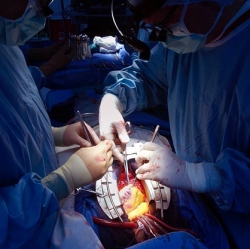
The New Organ Liver Prize is the first in a series of whole organ challenges and awards designed to help solve the global organ shortage, which afects millions of people around the world.
There are presently over 120,000 on the organ wait list in the U.S alone, many of whom will die before finding a compatible donor. Even those fortunate enough to receive an organ in time face ongoing medical difficulties, often for the rest of their lives.
New prospects for whole organ regeneration, engineering, and preservation offer potentially powerful solutions to this health crisis, but tissue engineering research is currently underfunded, receiving less than $500 million annually in the U.S. compared to $5 billion for cancer and $2.8 billion for HIV/AIDS. Neither the NIH nor the NSF provide signi"cant funding for whole organ tissue engineering, and the field also suffers from diffcult regulatory hurdles as well as broader shortfalls in biotechnology investment for pre-clinical research.
Methuselah Foundation CEO David Gobel commented, “Regenerative medicine is the future of health care, but right now the field is falling through the cracks. The New Organ Liver Prize is a celebration of how far we’ve come in organ transplantation to date, and a rallying &ag to mobilize the funding and attention required to take it to the next level.”
Bernard Siegel, founder and co-chair of the World Stem Cell Summit and executive director of the Genetics Policy Institute (GPI), said, “Growing a whole, healthy organ is one of the ultimate goals of regenerative medicine. The world stem cell community enthusiastically supports the ambitious aim of the Methuselah Foundation in launching the New Organ Liver Prize and the mobilization of this competitive challenge for researchers to cure disease and alleviate human suffering through tissue engineering.”
New Organ has been endorsed by prominent doctors and scientists across the field of regenerative medicine, including Dr. Anthony Atala of Wake Forest, Dr. Stephen Badylak of the University of Pittsburgh, and the Founding Fellows of TERMIS (Tissue Engineering and Regenerative Medicine International Society)
“Regenerative medicine and tissue engineering are at the cusp of conquering the final frontier, the fabrication of vital organs to de"nitively solve the organ donor shortage,” said Dr. Joseph Vacanti of Massachusetts General Hospital. “New Organ will help catalyze the efforts to solve the remaining problems to bring this life saving technology to all of the people who desperately need it.”
Incentive prizes can be powerful levers for raising the visibility and prestige of scientists working in new areas of research. Prizes have helped launch entire industries in the past, such as the Orteig Prize won by Charles Lindbergh in 1927, which transformed U.S. aviation. They are known for attracting new capital to diffcult problems, motivating top minds as well as non-traditional players, accelerating timelines of discovery, forcing regulatory reform, and galvanizing public demand.
